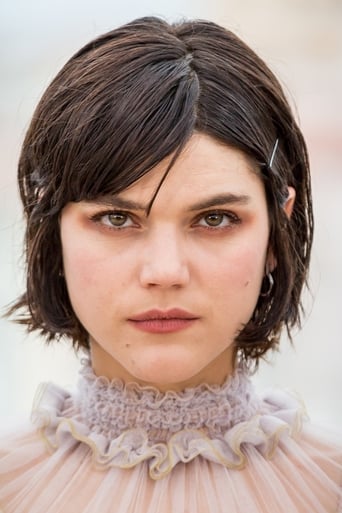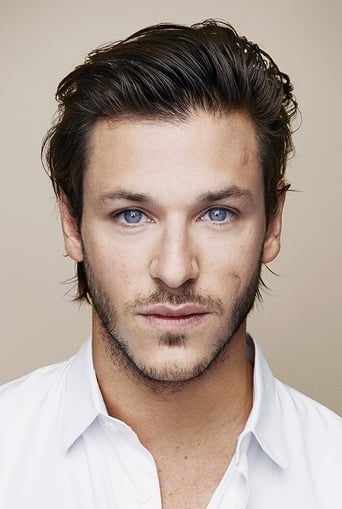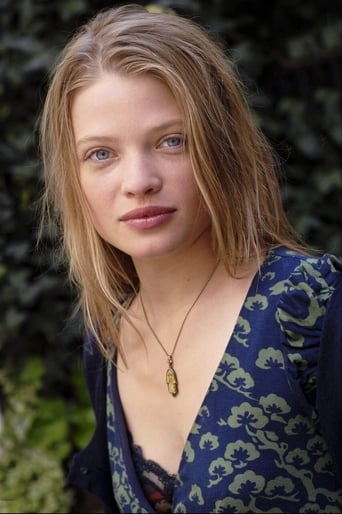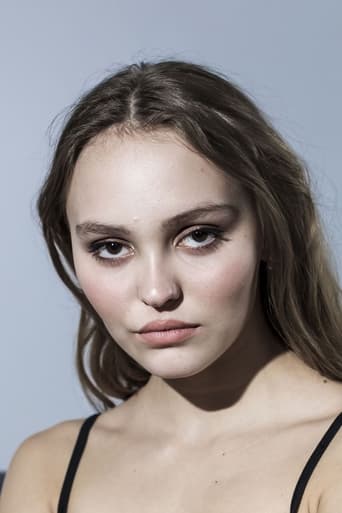RipDelight
This is a tender, generous movie that likes its characters and presents them as real people, full of flaws and strengths.
FuzzyTagz
If the ambition is to provide two hours of instantly forgettable, popcorn-munching escapism, it succeeds.
AutCuddly
Great movie! If you want to be entertained and have a few good laughs, see this movie. The music is also very good,
ChanFamous
I wanted to like it more than I actually did... But much of the humor totally escaped me and I walked out only mildly impressed.
BebeJumeau
The dance sequences were wonderful - all credit to Soko who did her own dancing, Fanny Sage who was body double to the delightful Lily Depp, and dance adviser US artist Jody Sperling a major dancer and innovative performer in her own right, whose work is excellently showcased here. I loved the intelligent and exciting re-staging of Fuller's dances and the more conceptual scene of Duncan's overtly erotic lap dance rapidly clearing multiple rooms of elderly fearful conservative white males - Kristeva meets Busby Berkley. Go to see the film for these breathtaking sequences alone It was good to see a female director tackling a female subject However the plot was inaccurate and ridiculous and clichéd in a manner that would be expected of Hollywood say in the 1950s. about 95% of the story apart from the dancing was made up. The decadent male junkie significant other and sponsor/art fund-er was an invention, the Montana/Wyoming childhood - possibly filmed in the Czech Republic was totally made up - although its nods in styling and lighting to those Europhile fantasies of the wild west - Heaven's Gate and the Hateful Eight were nice Easter eggs, the weird puritan temperance colony in New York where Fuller's on screen mother lived - adorned with a surprising amount of Catholic kitsch for a fundamentalist protestant cult - totally invented, the ignoring of Fuller's primary same-same lifestyle and the casting of Isadora Duncan as a duplicitous ambitious lesbian - All About Eve rang they wanted their plot line - makes the film down right homophobic And let's not mention the modernist myth of the outsider misunderstood genius battling through with courage and persistence ... yawn yawn yawn
guy-bellinger
"The Dancer", Stéphanie di Giusto's first opus, is an exciting, if not faultless, first film. Ambitious and finely crafted, this achieved project undeniably deserves praise but to some extent only.Let's begin with its merits. Its most obvious one is pedagogic. "The Dancer" indeed makes known to the general public the existence of an exceptional artist, Loïe Fuller, this American lady who revolutionized dance in New York first and then in the Paris of the Belle Epoque... before falling into unjust oblivion. To get back to Fuller, she was an amazingly inventive artist who, though no more than ordinarily gifted as a dancer, created a style unprecedented in the art she practiced. Not content to just dance, she managed to captivate audiences in her own personal way, the novelty of her manner lying in her waving robes extended on bamboo batons while rotating at the same time like a whirling dervish. And as if that were not enough to make her a sensation, she enhanced her performances by means of lighting and mirrors, thus creating a magical aura around her. All that made her so successful that she was immediately copied and had to file patents to discourage such imitations. Her being admired by such important figures as Toulouse-Lautrec, Rodin and Marie Curie is a further indicator of the powerful fascination she exerted on her contemporaries. Another asset of the film is its good production values (the settings and costumes really give you the feeling that you have been traveling through time and that you ARE in America and in France at the turn of the 20th century). Also of note is di Giusto's talent for filming the dance sequences. The Serpentine Dance and the Mirror Dance in particular are performed and filmed with such magic that the viewer just cannot watch them otherwise than agape. Danced by the amazing Soko to musical fireworks (notably Vivaldi arranged by Max Richter), these two sequences are really an out of this world experience. Naturally, not all the film can live up to such heights, but at least they exist: shown independently of the full movie, one could go as far as to call them masterpieces. The last strong point of "The Dancer" is its two main actresses : Soko, first, who has more than one common point with Loïe Fuller : no greater beauty (by traditional standards) than her and almost her lookalike, she is not either a great dancer (or even a dancer at all) but following Fuller's example in real life, she managed by dint of demanding physical training to equal her model. As for the younger Lily-Rose Depp, graced with a slimmer, more elegant body, and whose dancing is gloriously gracious and effortless, she is perfect for the role of Isadora Duncan, another pioneering performer who, although discovered by Loïe, would not be long in superseding her sponsor. But, as I put it before, this globally good film is not totally satisfying. To be more accurate, it can be... but if and only if you did not know anything about Loïe Fuller before viewing it. Supposing you did, you will probably feel irritated and frustrated. For is "The Dancer" supposed to be a biopic, following its central figure from cradle to tomb ? Or is it a fantasy inspired by her, in other words an original creation faithful to her spirit but taking liberties with the facts (like for instance Ken Russell's "Music Lovers" or Joann Sfar's "Gainsbourg, vie héroïque"). The trouble is that the finished product is... a bit of both. Actually, some parts of the narrative are true to the facts (Loïe discovering the effect she has on people while acting a scene of hypnotism during the play "Quack Medical Doctor" in 1891; Loïe at the Folies Bergère; her hiring the Sada Yako Japanese company during the Paris 1900 exhibition as well as her signing Isadora Duncan in 1902). But others are downright made up: Loïe was not born in the Wild West but in a Chicago suburb; her father, Reuben Fuller, was not a French born adventurer but the owner of a boarding house and then of a hotel, her mother was not only a starchy temperance activist, but alsoa dedicated supporter of her daughter who went as far as to accompany her to Europe in 1892; Loïe was not courted for a decade by a French drug- addict noble but was married for three years to a rich industrialist who proved to be a... trigamist; she craved being hired at the Opera de Paris but unless I am mistaken, her dream never really came true. Worst of all, whereas she gave up heterosexuality after her disastrous marriage, turned to Sapphic love and had a lifelong relationship with Gabrielle Bloch, her collaborator and admirer, nothing of the kind appears in the film. If Gabrielle IS shown by Loïe's side in many sequences, it is only professional reasons. How come? Why on earth erase this aspect of Miss Fuller's life if it is to replace it with "traditional" male-female sex attraction? Might Di Giusto be homophobic ? Not really, if you take into account that Loïe is seen having sex intercourse with her protégé Isadora. But even in these conditions there is a catch: the two latter women's relationship is seen as sorrowful for Loïe whereas she was very happy with Gabrielle. Does the author mean to say that unorthodox loves must be punished? I hope not.In any event, those reservations should not deter you from seeing "The dancer", a globally well made movie which, in spite of everything, constitutes a loving tribute to a great name of dance. Well interpreted and at times even inspired (the already mentioned dance sequences), it is well worth seeing. Simply, the definitive filmed version of Loïe Fuller's rich life and innovative art remains to be made.
mardou sarant
A very beautiful film directed with vigor and taste. To classify this film as biopic does not do justice to it and it is even misleading. I read so many ill directed criticism on what is and what is not historically accurate in the movie. Who cares? Who would criticize the Greek poet Kavafy for misrepresenting historical figures in his poems? For me 'The Dancer' is a poetic film on beauty and the passion for creativity and it was a pleasure to watch. For two hours I was immersed in the film's world, relishing every bit of it; the elliptical decor, the unreal almost lighting, the spectacular dance, the energy. Indeed what I liked most was the fact that the film did not make an effort to faithfully reconstruct an era, but rather create its own unique universe combining various elements in a coherent whole. Let alone the amazing amount of work that went into it, the production design, the choreography, the music. The audacious directorial approach is justified by the result. Soko's choice to play Loie Fuller was excellent as she brought into the part her own fierce determination to develop in the show and music business matched with confident and truthful acting. The film is an amazing feat anyway, but even more so as a debut feature.
richard-1787
For the last several decades, we have had movies showing us the grime behind the apparently beautiful world of the dance. This is another in that by now too long series, one that has nothing new to add. We see lots of ugly backstage scenes, and then, very rarely, a glimpse of the beauty of a Fuller performance.Part of that is because, if one were to judge from this movie, Fuller was very much a one-trick pony. She was not, in any significant sense, a dancer. Rather, she was a show woman who figured out how to use lighting and mirrors to create a beautiful, magical effect as she twirled around waving robes extended on bamboo batons.In fact, however, the real Loie Fuller was a fascinating and very versatile woman involved in developing new lighting techniques and all sorts of other things to improve stage performance. This movie VERY much shortchanges her, and should not in any way be taken as a biopic. Why a woman director would reduce an evidently very intelligent and interesting woman to a pouting bundle of uncontrolled emotions I do not know.If you were to believe this movie - and you shouldn't - there really wasn't much to Fuller's art. Nothing like ballet, or modern dance, or jazz dancing, or ... Just twirling around, waving her robes, while different colored lights and background mirrors enhanced the effect. So we are left with her life. If it was at all as it is presented in the movie, and there is no reason to assume that that was the case, it was pretty miserable. We see that she spends lots of time building up her shoulder muscles so she can keep waving those robes, with the result that her arms often hurt. The light from the colored light hurts her eyes. She ends up in several confusing and bad relationships. A rough life, in other words. But the movie does nothing to make us care.This movie needed a MUCH better script to make us understand and sympathize with Fuller. Otherwise, except for the few moments when she goes into her dance, it's just a lot of uncontrolled emotions that we have no reason to care about. It seems a real shame to have reduced what was evidently a very interesting and intelligent woman to a bundle of uninteresting emotions.





